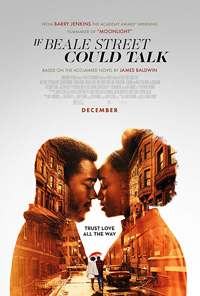 Media/Arts Media/Arts
If Beale Street Could Talk
With this film, director Barry Jenkins has created another masterpiece on the heels of his Academy Award–winning Moonlight. If Beale Street Could Talk, based on James Baldwin’s novel of the same name, takes place in New York City in the early 1970s and is another poignant love story, one carefully crafted against a backdrop of seething family conflicts and a wholly unjust and racist criminal justice system.
Fonny and Tish have been friends since they were toddlers. Their playful friendship gradually blossoms into a tender romance. A scene in which they make love for the first time depicts Fonny’s kind and gentle nature, respectful of Tish’s innocence and her potential fears about what is about to happen. It is a beautifully orchestrated moment.
After being falsely accused of a crime, Fonny is incarcerated and while he is in jail, Tish visits to tell him she is pregnant. Family opinions about the pregnancy differ and when Tish and her family meet with Fonny’s family to inform them, tempers flare and Fonny’s father’s long-held resentment of his wife’s “holier than thou” attitudes explodes. Jenkins’ skill as a screenwriter and director are displayed whether it is a tense moment, or a loving one. His dialogue is sharp when needed and soft when not, but is always authentic and perfectly suited to the tone of the scene.
One of the most enjoyable features of a Jenkins film is the lush cinematography, saturated with rich hues that evoke viewers’ nostalgic feelings of having been there before. I can’t say enough about the artistry of this film. In my view, it is a must-see.
— Marianne Mallon, Editor
|